Translator’s Note
"After all, there's always a recursive component to utterance."
By Amanda DeMarcoAugust 13, 2015
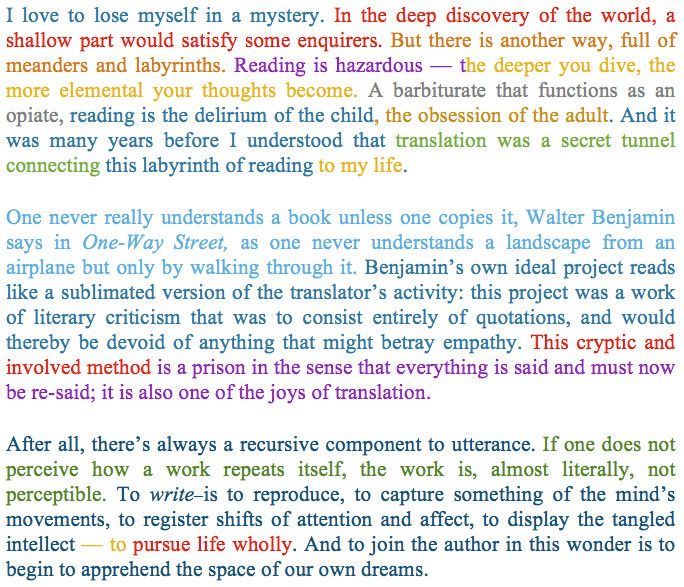
Ah Amanda, toujours fidèle.
— Roland Barthes
A TRANSLATOR must naturally take certain liberties with other people’s words in order to wrest the most truth into the text. In this essay on translation, composed strictly of quotations, I have taken the liberty of replacing select words and phrases with “translation,” “translator,” and the various verb forms of “translate.”
I have also committed untold infidelities.
¤
I love to lose myself in a mystery. In the deep discovery of the world, a shallow part would satisfy some enquirers. But there is another way, full of meanders and labyrinths. Reading is hazardous — the deeper you dive, the more elemental your thoughts become. A barbiturate that functions as an opiate, reading is the delirium of the child, the obsession of the adult. It was many years before I understood that translation was a secret tunnel connecting this labyrinth of reading to my life.
One never really understands a book unless one copies it, Walter Benjamin says in One-Way Street, as one never understands a landscape from an airplane but only by walking through it. Benjamin’s own ideal project reads like a sublimated version of the translator’s activity: this project was a work of literary criticism that was to consist entirely of quotations, and would thereby be devoid of anything that might betray empathy. This cryptic and involved method is a prison in the sense that everything is said and must now be re-said; it is also one of the joys of translation.
After all, there’s always a recursive component to utterance. If one does not perceive how a work repeats itself, the work is, almost literally, not perceptible. To write is to reproduce, to capture something of the mind’s movements, to register shifts of attention and affect, to display the tangled intellect— to pursue life wholly. To join the author in this wonder is to begin to apprehend the space of our own dreams.
Yet we know that the thoughts that come to us in dreams are more false than the others. Even the loveliest dream bears like a blemish its difference from reality, the awareness that what it grants is mere illusion. At some very late stage, one senses that it is its longings which have condemned it — a discontent with reality expressed as a longing for another world. In translation, a discontent with reality expresses itself forcefully and most hauntingly by the longing to reproduce this one. The fabrication of a new, parallel reality flies in the face of the already created and as such is based on negation, and what should be the vacuum of a dream becomes continually replete as the source of dreams.
Reality and perfection I use as synonymous terms — everyone knows what happens when you’re trapped in the dream of the Other. In other words, in translation, anything you do will be an abuse of somebody else’s aesthetics, which you, you poor thing, won’t be able to resist. Irreverence and sincerity are not opposed, and where truth seems double-faced, there is no woman more paradoxical than myself. Disingenuousness of this magnitude has its charms. No thief can bear that another thief should steal from her, but I’ve never heard of a crime that I could not imagine committing myself. As a writer, you could die of cruelty; as a translator, you could die of despair. The desperation of the translator’s attachment to this text is equaled only by her inability to describe its actual import. In the nihilistic and sentential idea of “the interesting,” the final orbit is oneself.
Precisely there where you are not — that is the beginning of writing, but I hate traveling and explorers; the soul has to stay where it is. Translation makes the strange familiar. Essentially, it makes everyone a tourist in other people’s reality and eventually in one’s own. Remembering my country, I imagine it, and though every man is not only himself, all alone is all we are.
You may see and be affected by other people’s ways, you may even use them to find your own, but you will eventually have to free yourself of them. Roland Barthes purged himself of the masters and master-ideas from which he drew sustenance (“In order to speak one must seek support from other texts,” he explained), only to stand in the shadow of himself. Like diamonds we are cut with our own dust. In every work of genius we recognize our own rejected thoughts; they come back to us with a certain alienated majesty.
So: no more masters, no more masterpieces. What I want (instead of God the novelist) is a self-portrait in a convex mirror. A portrait, of which the translation is the reflection, of which the translation is the reflection once removed. I’m the best Amanda-DeMarco-style translator in the world, but it’s too easy to see I’m unauthorized. I am caught up in a double discourse, from which I cannot escape.
And I cannot explain the action of leveling, why a translation should all boil down to one uniform substance, a magma of interiors. We commonly do not remember that it is, after all, always the first person that is speaking. Because all identification with characters, deeply conceived, is an impertinence — an affront to the mystery that is human action and the human heart. The voices of the narrative come, go, disappear, overlap; we do not know who is speaking; the text speaks, that is all: no more image, nothing but language. What is inevitable in a work of art is the style. It is what is sequestered.
True translation has its own shadows. One volunteers to seek out the pain of others. In humanist jargon, the highest vocation of translation is to explain man to man. But all great myths are dark and one cannot imagine all the great fables aside from a mood of slaughter, torture, and bloodshed, telling the masses about the original division of the sexes and the slaughter of essences that came with creation. To understand — is that not to divide? The demon is plural (My name is Legion). Reassembling fragments of the pure, untranslatable, sensuous immediacy would be the absolute art, true because it is impossible.
But offerings can be made to these birds of prey, the fallen angels, in more ways than one. If we are our own demons, then how to repulse one (an old problem)? In my solitary and retired imaginations, it was my ambition to say what everyone else says — what everyone else does not say. With my language I can do everything: even and especially say nothing. For, every use of language about language will tend to produce more language; but the deeper purpose of language is to produce the silence of understanding, the consent between speech and its object, between speaker and hearer. There are spiritual resources beyond effort, which appear only when effort is stilled.
There is nothing more lacerating than a voice at once beloved and exhausted; a broken, rarefied, bloodless voice, one might say, a voice from the end of the world, which will be swallowed up far away by the cold depths. To the author, I can only say: my guide in these matters is yourself; I love you, you dummy.
¤
This piece is part of a series of texts using collage and quotation to explore the concept of the authorial voice.
¤
Applebaum, Anne. Gulag: A History. New York: Doubleday, 2003.
Artaud, Antonin. The Theatre and Its Double. 1964. Trans. Victor Corti. London: Alma Classics, 2010.
Ashbery, John. “Self-portrait in a Convex Mirror.” Self-portrait in a Convex Mirror. New York: Penguin Books, 1976.
Barthes, Roland. A Lover’s Discourse: Fragments. Tr. Richard Howard. New York: Farrar, Straus and Giroux, 1977.
Browne, Sir Thomas. Hydriotaphia, Urn Burial, or, a Discourse of the Sepulchral Urns lately found in Norfolk. 1642 & 1658. New York: NYRB Classics, 2012.
Dyer, Geoff. Paris Trance. New York: Farrar, Straus and Giroux, 2000.
Greenblatt, Stephen. Introduction. Religio Medici and Urne-Buriall. By Sir Thomas Browne.1642 & 1658. New York: NYRB Classics, 2012.
Hessel, Franz. In Berlin. 1929. Trans. Amanda DeMarco. Berlin: Readux Books, 2013.
Magazine. “I Love You, You Big Dummy.” Secondhand Daylight. Virgin, 1979. MP3.
Ruefle, Mary. Madness, Rack, and Honey. Seattle: Wave Books, 2012.
Saint Augustine. Confessions. Trans. R. S. Pine-Coffin. New York, Penguin Classics, 1961.
Schönthaler, Philip. When the Heart Drowns in Its Own Blood. Trans. Amanda DeMarco. Berlin: Readux Books, 2014.
Shields, David. Reality Hunger. New York: Knopf, 2010.
Sontag, Susan. Against Interpretation. 1961. London: Penguin Classics, 2009.
—-. On Photography. 1977. London: Penguin Modern Classics, 2008.
—-. Under the Sign of Saturn. 1972. London: Penguin Classics, 2009.
Spinoza, Baruch. The Ethics. 1677. Tr. R. H. M. Elwes. In The Rationalists. New York: Doubleday, 1960.
Stonecipher, Donna. The Cosmopolitan. Minneapolis: Coffee House Press, 2008.
Weinberger, Eliot. Oranges & Peanuts for Sale. New York: New Directions, 2009.
Wood, James. The Fun Stuff. New York: Farrar, Straus and Giroux, 2012.
Žižek, Slavoj. Violence. London: Profile Books, 2009.
¤
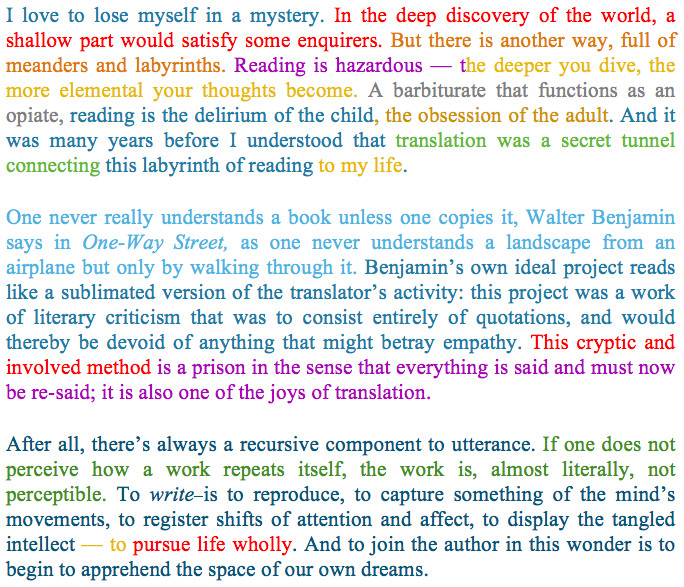
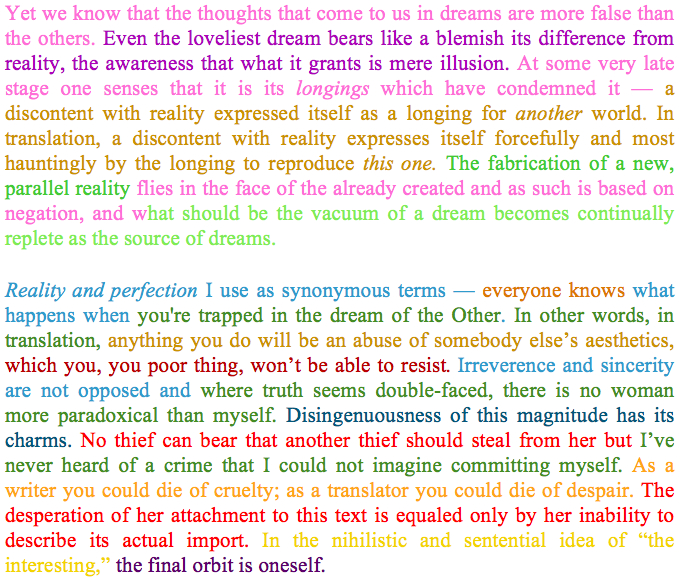

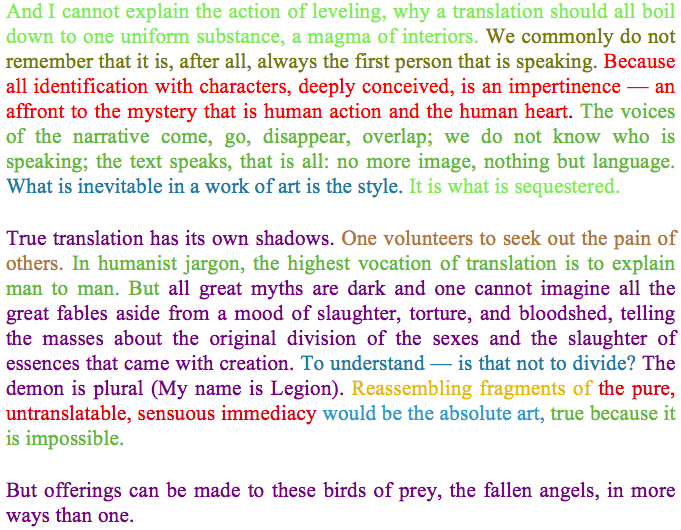
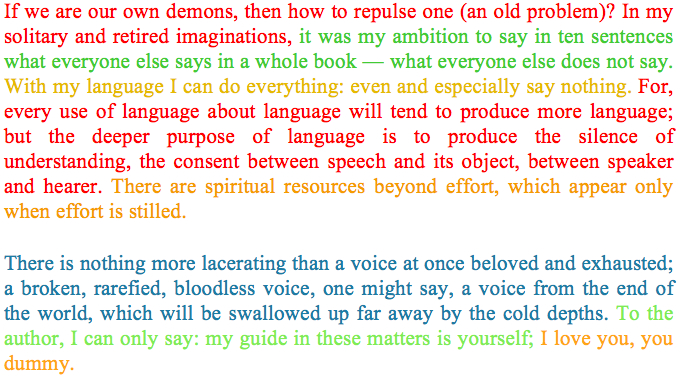
¤
LARB Contributor
Amanda DeMarco is a translator of German and French literature and philosophy.
Photo: Anastasia Muna.
LARB Staff Recommendations
Finding Susan
Daniel Schreiber’s "Susan Sontag," the first biography published since her death, offers an opportunity to reassess how we approach the last great...
After Translation
Michael Leong examines Ignacio Infante's "After Translation: The Transfer and Circulation of Modern Poetics Across the Atlantic."
Did you know LARB is a reader-supported nonprofit?
LARB publishes daily without a paywall as part of our mission to make rigorous, incisive, and engaging writing on every aspect of literature, culture, and the arts freely accessible to the public. Help us continue this work with your tax-deductible donation today!